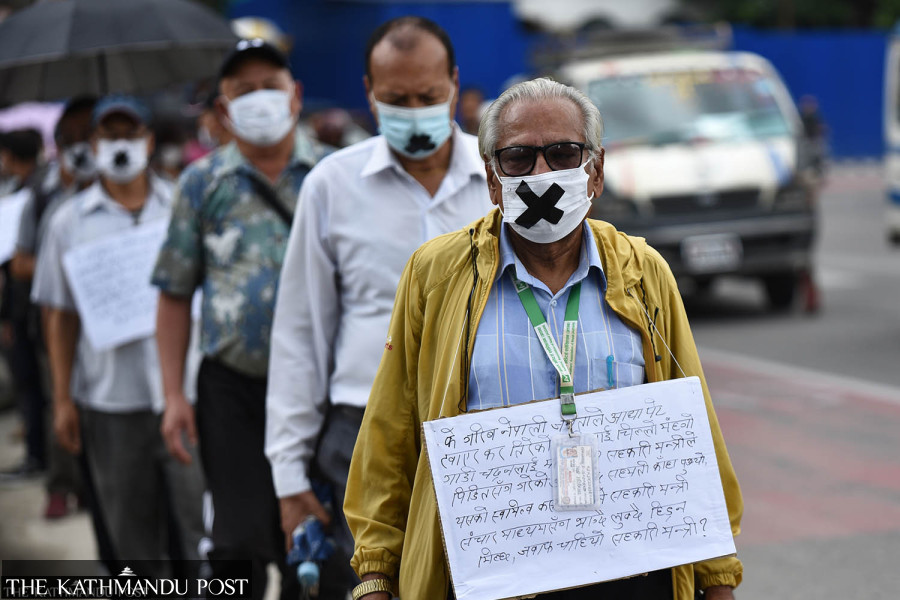National
‘Disheartening’: Cooperatives victims say Nepali Congress has let them down
The party had obstructed Parliament last year demanding justice for cooperative victims.
Post Report
About a year ago, Nepali Congress obstructed parliamentary proceedings several times, demanding the formation of a parliamentary inquiry committee to investigate cooperatives fraud.
The Congress was the main opposition back then and had pressed the Pushpa Kamal Dahal-led government to form the inquiry committee. But now that it is in power, the largest party in Parliament appears to have retreated from its commitment to delivering justice to cooperatives victims.
What once seemed like a determined stand of the party in favour of justice and accountability has now given way to political indifference.
For nearly a month, individuals who have fallen victim to cooperatives fraud and mismanagement have been staging a peaceful protest at Shantivatika, Ratnapark. The victims of microfinance have shown their solidarity with the protest of cooperative victims. These protesters—many of whom have lost their life savings—have been appealing to the government for justice, transparency, and the recovery of their hard-earned money.
Despite the prolonged demonstration and the emotional and financial toll on the victims, their cries for help have fallen mainly on deaf ears within the corridors of power—Singha Durbar, which is just a few hundred metres from Ratnapark.
Last year, around the same time, the proceedings of the House of Representatives were obstructed for months following a protest by the Congress, demanding the formation of a parliamentary committee to investigate the cooperatives fraud in which then-home minister and Rastriya Swatantra Party (RSP) President Rabi Lamichhane is connected.
Lamichhane was accused of misappropriating the cooperatives funds to run the Galaxy 4K TV, where he was managing director. The TV, run under the Gorkha Media Network, is now defunct.
To end the prolonged deadlock in parliamentary proceedings following days of obstruction, the ruling and opposition parties had agreed to constitute a probe panel on May 28.
The committee formed under the leadership of CPN-UML lawmaker Surya Thapa was given three months to submit its report. The committee had two representatives each from the Congress and the UML, as well as one each from the CPN (Maoist Centre), the RSP, and the Rastriya Prajatantra Party.
The parliamentary probe committee submitted its report in September last year, implicating several individuals, including Lamichhane. The probe report also has suggestions for the government to resolve the problems of cooperatives across the country.
Lamichhane and a few others are currently under police custody.
The government has established the National Cooperative Regulatory Authority to address issues related to cooperatives. However, the problems faced by victims of fraud remain unresolved.
These victims have been staging a protest at Shantivatika, Ratnapark for over three weeks now. While the government has invited teachers protesting in the Maitighar-Baneshwar area of Kathmandu for dialogue, no such initiative has been taken to address the grievances of cooperatives victims.
“What makes the situation more disheartening is the role of teh Congress,” says Ramchandra Phuyal, who lost his savings to a cooperative.
Phuyal noted that, just a year ago, while in opposition, the party was highly vocal about the cooperatives crisis. The party even went to the extent of obstructing parliamentary proceedings to pressurise the government into taking action and prioritising the plight of the victims.
“Their stance gave hope to victims like me who believed that the party would take concrete steps to deliver justice,” Phuyal said. “Despite raising the agenda in Parliament, the party did nothing substantive to address our problem.”
He added, “It turns out that the real intention behind raising the issue of cooperatives victims and obstructing Parliament was to join the government.”
Despite being the major coalition partner, Congress has adopted a more passive approach to addressing the issues of cooperatives. The urgency and empathy once displayed have diminished significantly, leaving the victims feeling abandoned and betrayed, said another cooperative victim.
Despite having the political authority to act, the party has yet to make meaningful progress on addressing the concerns it once championed so passionately, the victim adds.
Congress spokesperson Prakash Sharan Mahat acknowledges that, although the party had raised the issue of cooperatives strongly in Parliament, it has recently failed to give the matter the attention it deserves in terms of seeking a resolution.
“No one seemed to have anticipated that the cooperatives crisis would emerge on such a scale,” Mahat said. “We all understood cooperatives to be institutions built on trust. There was no foresight that the situation would spiral out of the control of cooperative operators. The state should have established a regulatory body to monitor cooperatives, and in the absence of such oversight, serious issues arose in the sector.”
Mahat, however, defended that the Congress party has not backed away from addressing the issue. “Though the pace at which efforts should have been made to resolve the crisis has certainly not been maintained,” he said.
Kushluv KC, chair of National Campaign for Protection of Cooperative Depositors, said that neither the Congress nor the UML and the Maoist Centre are positive about addressing their issue. “We had presented a 16-point proposal to the major three parties some time ago, seeking their attention to the issue,” KC said. “But none of them has made a positive response to our demand.”




 11.12°C Kathmandu
11.12°C Kathmandu













